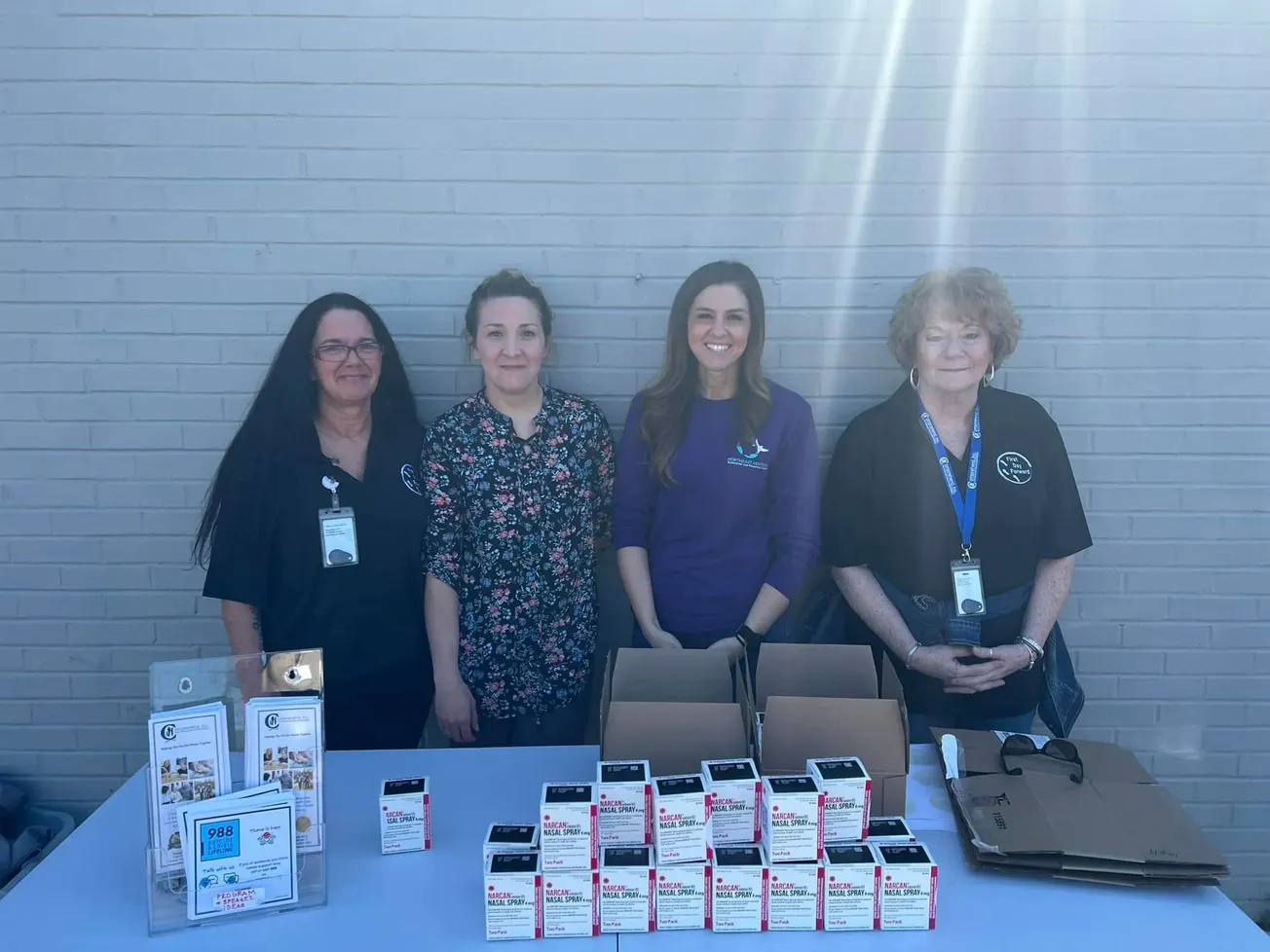“Every time I was incarcerated,” Brittany Herrington said, “every single time, I did not want to do drugs when I left. I wanted to get a job, get a home, get my kid back. Every single time. Nothing was gonna stop me.
“But no one sat me down and said, ‘When you get out, it’s going to be really, really hard. There are steps you have to take to make these things happen.’”
One Tuesday morning not long ago, Herrington sat in a conference room at the Greenup County Detention Center in Eastern Kentucky and recalled her years cycling through the criminal justice system while in the throes of addiction to prescription pain pills.
Herrington is a Greenup County native. “This was my first home away from home, at 18 years old,” she said, in reference to this very structure. “Right here. Cried the whole three days.”
“Every time I went to jail, I wanted to get better,” she asserted. “But I had no examples of how to do otherwise.”
Herrington eventually found a model of stability – a woman who had faced similar challenges and overcome them – and today she’s project coordinator for First Day Forward, a program offering support and assistance to people with substance use disorder who are reentering their community after incarceration.
The program was created through a Rural Communities Opioid Response Program grant from the federal Health Resources and Services Administration and operates under the Northeast Kentucky Substance Use Response Coalition, a partnership of multiple organizations throughout the region. It’s now in place in seven rural Eastern Kentucky counties: Carter, Clark, Greenup, Mason, Powell, Rowan, and Montgomery.
“Every time I left incarceration,” Herrington said, “I was faced with everything that I had left: same people, same places, same habits, same routines; no new skills. And it got worse really, really quick.”
“We don’t want that for our people,” she said. First Day Forward offers a stable foundation from which to build.
Been through it
First Day Forward was born of interviews conducted with people in area jails living with a substance use disorder, asking them what they would need when they got out for a successful reentry to the community and to support their recovery.
The program is for those who have a self-identified substance use disorder; it’s important they acknowledge they have a disorder. Most critical is that “they want to work to change,” Herrington said. “You’ve got to want to put the work in.”
The lynchpins of the program are its peer support specialists. Randy West is one such. Like Herrington, he’s a Greenup County native. And also like Herrington, he was no stranger to this detention center.
West estimates he’s been provided accommodations in these jail cells on 18 occasions, the first for a DUI. In his early 20s, he entered a cycle that took him from alcohol to Xanax to prescription opioids to heroin; he was “running the streets” selling drugs.
“Quite a few years of my life – I can’t remember much of it,” West said. It took a few tries, but he eventually found the treatment he needed. He now mentors those who will benefit from his wisdom.
“One of the first questions I get asked by new participants,” West said, “is if I’ve been through what they’ve been through” – has he slept in those racks, felt the paralysis of despair. “And whenever they know that, they’re so much more comfortable. They’re like, ‘Okay, I can loosen up and talk with this guy.’”
Participation in the program generally begins 60 to 90 days prior to release, with both individual and group meetings. A needs assessment is conducted at the outset; a case plan is then mapped to establish objectives and how to attain them.
Among the things participants most urgently need is something as fundamental as an ID, a social security card, or a birth certificate. Some 70% of screened inmates identify as needing at least one of those three.
First Day Forward alum Brandon Adams had never had a driver’s license. He now has one, drives a minivan, regained custody of his three daughters, and also has custody of a granddaughter. And he met his fiancé through the program.
“We’ve been together almost three years,” he said. “We keep each other in line.”
Cassidy Begeot serves as the First Day Forward peer support specialist for women in Greenup County. “I did two years in three different county jails,” she said, “and the whole time I sat in there I really knew I wanted something different. I would replay all the things I had learned in groups, from social workers, from people that came in and out of my life … and I knew I wanted something different. I just didn’t know how to get it.”
Begeot’s work as a peer support specialist offers “a constant reminder of where I was, where I want to be, where I don’t want to be again,” she said. “And I need that daily.”
Moreover, the job offers full-time employment with benefits.
‘Real now, right?’
The day of release from jail, the participant is met by their peer support specialist and the case plan is revisited.
“Because stuff’s real now, right?” said Herrington. “We planned for this two months ago … but now we’re here. So what are we doing today? What are we doing this week? What are we doing long term? What do we want? We’ve got these needs; we’ve got these wants. It’s here now.”
Over the next 90 days, as many objectives are met as possible. That period can then be extended as necessary.
A relapse doesn’t mean mandatory expulsion.
“We give them the opportunity to restart, and help them along the way,” said Carla Terry, First Day Forward project director for three counties. But they must show a willingness to keep working toward their recovery. And some further reassessing, recalibrating of that case plan, may be in order.
“If the medication for diabetes is not working, we’ve got to change the diet, right?” Herrington said. “We’ve got to change the diet and maybe change the medicine.” Likewise with substance use disorder. There are myriad paths to recovery.
Perhaps the biggest obstacle in a successful transition is affordable housing. Like most everywhere else in the country, rural and urban, there’s precious little in this region. Then there’s the issue of background checks and landlords who won’t lease to those with felonies on their record.
First Day Forward peer support specialists help break down some of those barriers, guiding participants toward available resources. And their presence in the community helps counter the stigma around substance use disorder.
‘Offered us grace’
Judges want options, Herrington said. “I think we’ve heard that from almost every county where we sat down and met with judges at the onset of these projects. They’ve said, ‘We want more alternative-sentencing options.’”
When Greenup County Jailer Larry Pancake took office in January 2023, he enthusiastically embraced introducing First Day Forward into his facility. “I think everybody’s broken, including myself, in some way or another,” he said. He’s a strong proponent of rendering a jail term restorative.
Robert Sanders came to work in July as Pancake’s chief deputy after 30 years with the sheriff’s department. He said that on his first day on the job “I knew more inmates than I did employees” – the faces of so many he’d brought to the jail countless times.
Sanders said the jail had been, essentially, “a storage house for trouble; just throw ’em away and forget about it.” He believes First Day Forward has already begun to improve the recidivism rate there. “What they’re doing helps; it works.”
The recidivism rate for those who’ve successfully completed the program throughout the region is 23.5%, while the general recidivism rate in, for example, Clark County is 53.2%.
For Casey Moore, the program was “the foundation I needed to be loved back to life.” Her addiction started with prescription pain pills; she then transitioned to heroin. She was in and out of jail and living on the streets, no contact with her kids.
She’s now the assistant general manager of a restaurant where she’s proactive in hiring people who’re in treatment, then lending them support.
“I’ll go pick them up for work,” Moore said. “I’ll take them home from work. I work with them on their schedule so they can go to their meetings. I help them with housing; I connect them with people in the community.”
After successfully completing the First Day Forward program, Moore still faced charges that had a mandatory sentence of seven years; but there’s a stipulation in the law that if incarcerating someone would be detrimental to the community, the sentence can be probated.
All parties agreed “that it would do more harm to her community to put this girl in jail,” Herrington said, “because she had done so much work changing her community.”
“I think one thing that, across the board, we all have in common,” Herrington said, “is someone offered us grace in our recovery. Someone offered us grace – and someone provided a model for us to follow.”
--30--
Written by Taylor Sisk. Cross-posted from the Daily Yonder.
Comments







